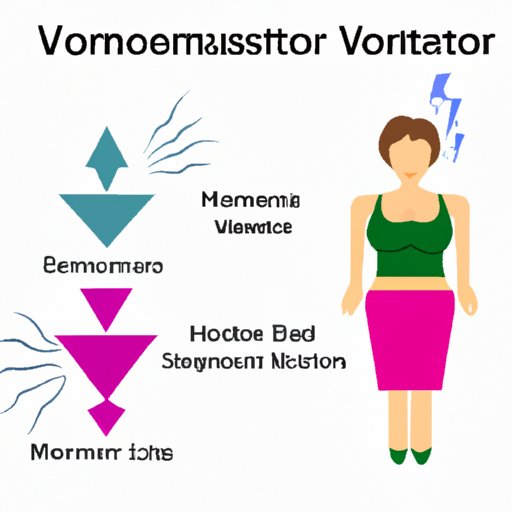
Vasomotor Symptoms: An In-depth Analysis of Hot Flashes and Night Sweats
Vasomotor symptoms are common in women. These symptoms arise due to changes in hormones, and they are prevalent during menopause. Although vasomotor symptoms are not detrimental to health, they impact daily activities and contribute to an uncomfortable and unpleasant sensation. In this article, we provide a comprehensive guide to understanding vasomotor symptoms, their impact on women, and tips and tricks to manage them effectively.
Defining Vasomotor Symptoms: An In-depth Discussion of the Term and Its Connotations
Vasomotor symptoms are a collection of physical symptoms experienced during menopause. These symptoms are a result of changes in hormones levels. Vasomotor symptoms occur when the body’s temperature regulation system becomes altered, which leads to hot flashes and night sweats.
There are two types of vasomotor symptoms: hot flashes and night sweats. Hot flashes are a sudden feeling of warmth that spreads throughout the body, mostly contained in the face, chest, and neck. The flash often starts with warmth, followed by a sudden chill, and sweating. Night sweats refer to the same sensation, but they occur during sleep.
Vasomotor symptoms occur due to changes in the body’s hormone levels. There is a decrease in estrogen production, which affects the hypothalamus, the part of the brain responsible for regulating temperature. As a result, the hypothalamus becomes more sensitive and more prone to respond to sudden changes in body temperature, leading to hot flashes and night sweats.
A Comprehensive Guide to Understanding Vasomotor Symptoms and Their Impact on Menopausal Women
Menopause is a natural process that occurs when a woman stops having her menstrual cycle. The average age for menopause is 51 years, but women can experience it earlier or later. During menopause, hormone levels change, leading to several symptoms, including vasomotor symptoms such as hot flashes and night sweats.
Hormones play a significant role in the onset of vasomotor symptoms. They regulate the body temperature and the way the body deals with heat. Estrogen is the predominant hormone responsible for managing temperature change in the body.
At least 75% of women experience vasomotor symptoms during menopause. Hot flashes and night sweats can be bothersome, leading to disturbed sleep patterns and reduced quality of life. Women experiencing vasomotor symptoms often report feeling anxious, irritable, and embarrassed.
Unraveling the Trending Topic: Vasomotor Symptoms – What You Need to Know About Hot Flashes and Night Sweats
Hot flashes and night sweats are a defining characteristic of vasomotor symptoms, as mentioned earlier. They are more common during the perimenopausal and postmenopausal periods. Common triggers for hot flashes and night sweats include drinking alcohol, smoking, caffeine intake, and stressful situations.
Dealing with hot flashes and night sweats can be challenging, but there are several tips that can help minimize their impact. The first step is to stay cool, both physically and mentally. Dressing in layers, using a fan, or investing in cooling devices can help alleviate the discomfort that comes with hot flashes and night sweats. Good sleep hygiene, such as avoiding stimulants like caffeine and maintaining a consistent sleep routine, can also help reduce the likelihood of experiencing hot flashes at night.
From Physiology to Psychology: An Overview of Vasomotor Symptoms and the Multifactorial Contributors
The onset of vasomotor symptoms is multifactorial. Aside from physical changes, psychological factors also play a crucial role in their occurrence and intensity. Anxiety, depression, and stress are psychological variables that contribute to vasomotor symptoms. Women who have a history of depression and anxiety are more likely to experience vasomotor symptoms during menopause.
The body’s temperature regulation system varies between individuals, leading to differences in the way individuals experience vasomotor symptoms. For example, women with a lower core body temperature may be more prone to experience hot flashes and night sweats because their bodies require less heat to trigger the response from the hypothalamus. Meanwhile, women with higher core body temperatures may not experience these symptoms, even with the same amount of external heat.
The impact of vasomotor symptoms cannot be overemphasized as these symptoms significantly affect the quality of life of women experiencing them. Women experiencing vasomotor symptoms also report a decline in mood and a decline in their overall well-being.
Managing Vasomotor Symptoms: Tips and Tricks to Deal with Hot Flashes and Night Sweats in the Best Possible Way
Several treatment options are available for managing vasomotor symptoms. Hormone replacement therapy (HRT) is a popular hormonal treatment that many women use to manage vasomotor symptoms. HRT helps replace the estrogen that the body is no longer producing, reducing the occurrence and severity of hot flashes and night sweats. However, in some cases, HRT can come with some risks, and not all women are suitable candidates for this treatment.
Lifestyle changes are an essential part of managing vasomotor symptoms. Women can keep a diary to identify triggers that prompt hot flashes and night sweats and plan their activities accordingly. Other lifestyle changes include reducing caffeine intake and staying cool by keeping the environment temperature low. For women with severe vasomotor symptoms, over-the-counter medications such as ibuprofen have been known to work effectively.
Conclusion
Vasomotor symptoms are an essential part of the menopausal experience. Although they are common, they can pose significant challenges to women’s overall well-being and daily activities. The good news is, several lifestyle changes, medications, and hormonal treatments are available for managing vasomotor symptoms. Our final advice to women experiencing vasomotor symptoms is to reach out to their healthcare provider for the best treatment options for their situation.





